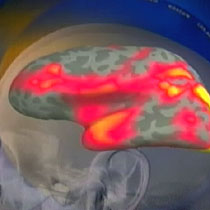2007年VOA标准英语-Watching a Thought as It Takes Shape in the Bra(在线收听)
Washington
13 April 2007
Researchers studying how the brain works say they have begun to be able to see a thought as it forms in the human mind. Scientists in Germany at the Max Planck Institute for Human Cognitive and Brain Sciences say their brain scans at the moment a person makes a mental choice could have big implications for efforts to control many difficult mental disorders. VOA's Paul Sisco reports.

Brain scan illustration of thought formation
Scientists at the Max Planck Institute in Germany want to know how thought works. They report their sophisticated scans have captured images of the human brain making a choice. Some say this has clarified the physical basis of free will.
The process involves magnetic resonance imaging that essentially illustrates what a person's intention is -- what thought the subject is forming -- from a detailed computer analysis of brain activity patterns.
John Dylan-Haynes leads the research. "We used a technique where you basically shine like a torch around the brain to visualize that, you search through the brain for regions where you can tell what a person is intending to do," he explains, "and we found such a reason that was very powerful in telling what a person's current plans are."
In the medial prefrontal cortex, they discovered slight differences in patterns of activity when subjects were asked to choose whether to add or subtract two numbers. Brain-scan images were taken at the moment they chose either "add" or "subtract." After hundreds of tests, the data began to form recognizable patterns.
The green regions on an image of the brain are where intentions or plans are stored. The red is where actions are being carried out in the moment. "Apparently when our plans are carried into execution, they get copied to a different part of the brain to be executed," explains Dylan-Haynes.
Tanya Steinbach was a study participant. "You are just told to focus on the task, and that is normally what you do. Sometimes, you know, I had to force myself to stay awake, because it's a little tiring..."
In the Hollywood film "Minority Report," authorities use mind-reading technology to target individuals. Is that a concern?
Professor Colin Blackmore oversees the research at the Max Planck Institute. "Can we look forward to a world in which we will be scanned as we walk through airports, and they will know all about us and what we are thinking? Not only do I think that is unlikely, but it is important to point out that scientists have started to think about those issues already."
He says this kind of basic research has enormous potential for medical science. "There are very serious cognitive conditions like autism, schizophrenia, obsessive compulsive disorder, in which people have difficulty in controlling their own intentions and actions," adds Blackmore.
A skeptic says the effort in Germany is aimed at "machines that can look into your soul," but the scientists hope their research will lead to new understanding of these perplexing and difficult disorders.